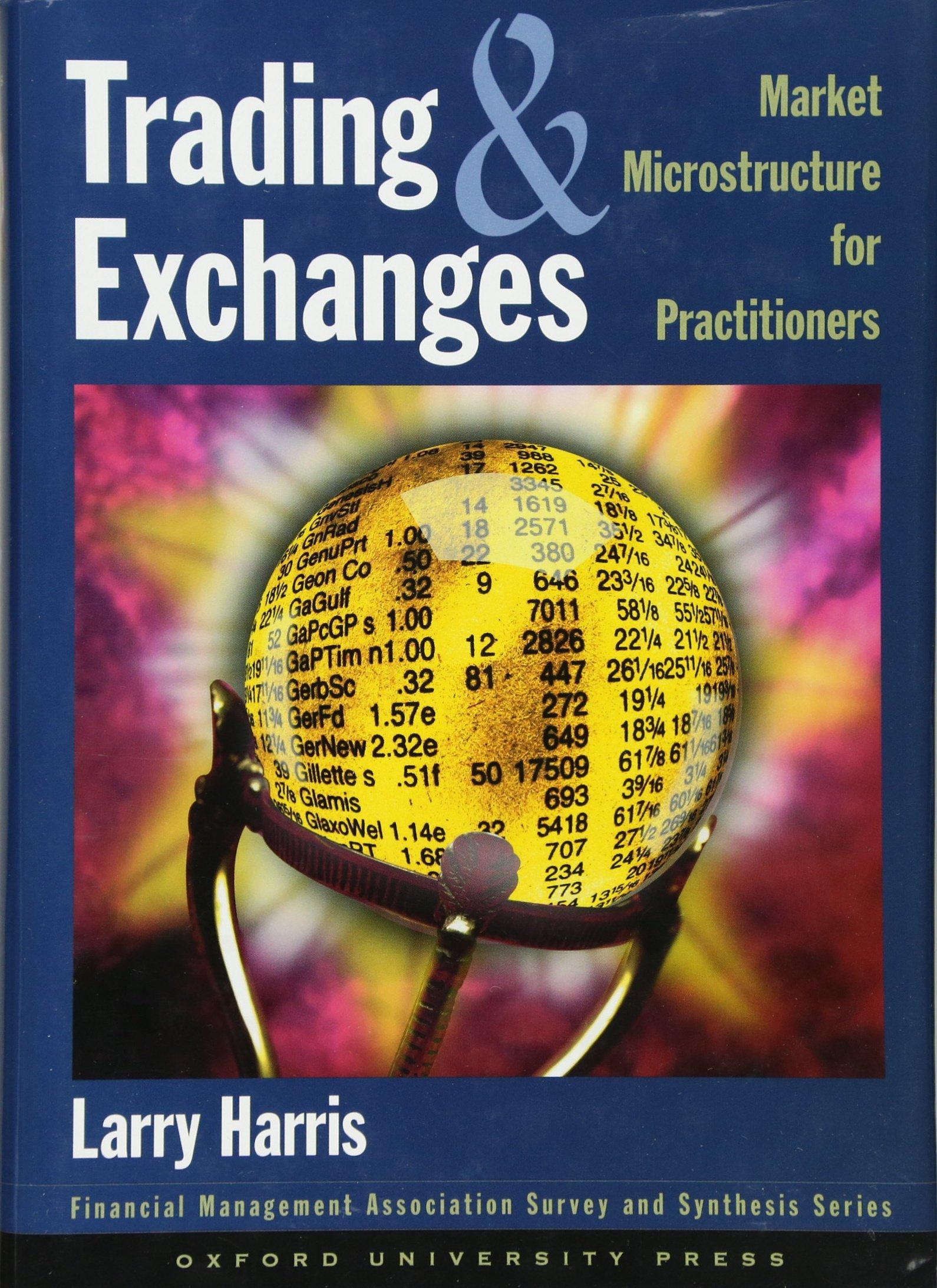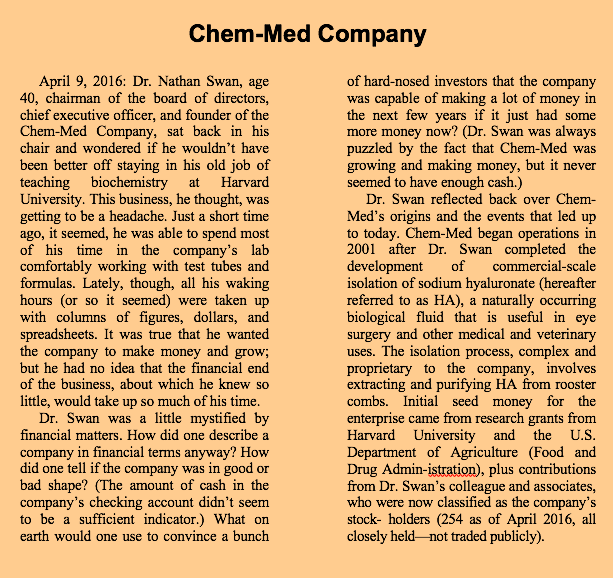
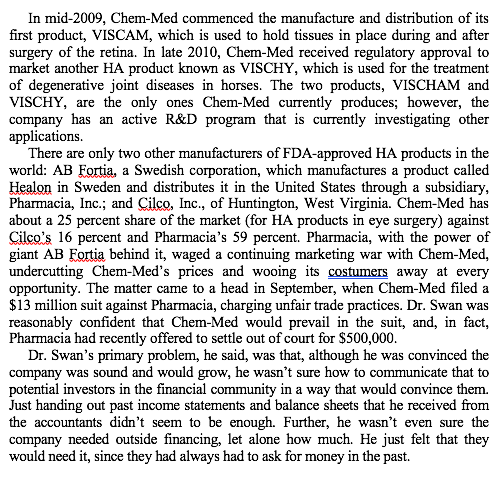
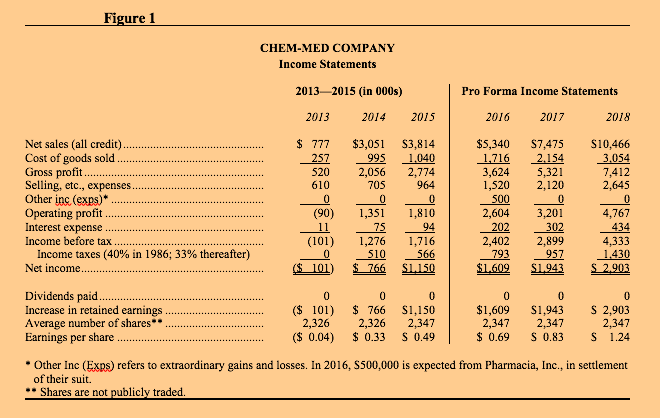
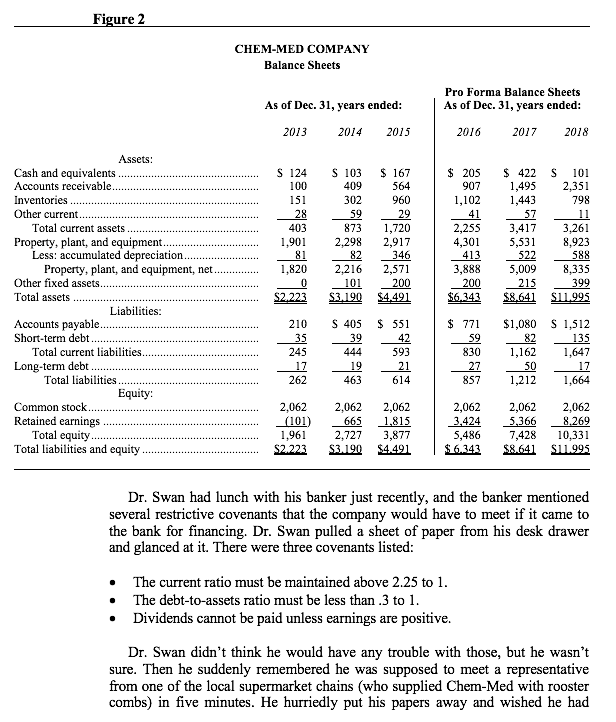
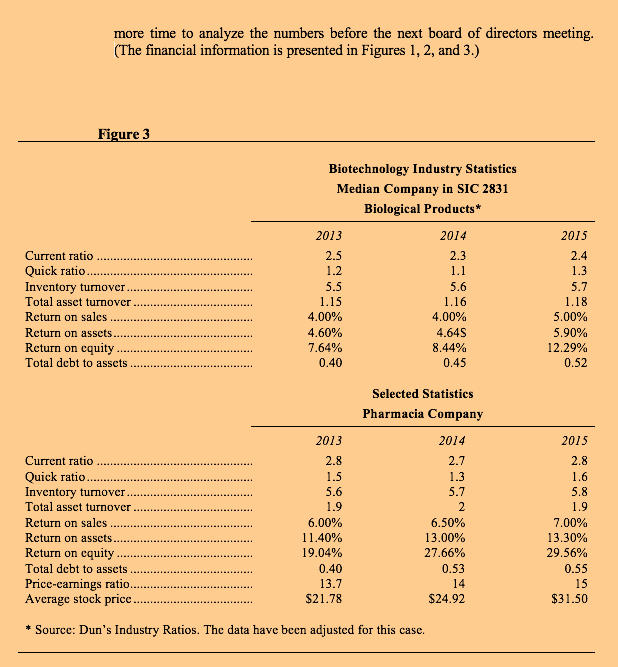
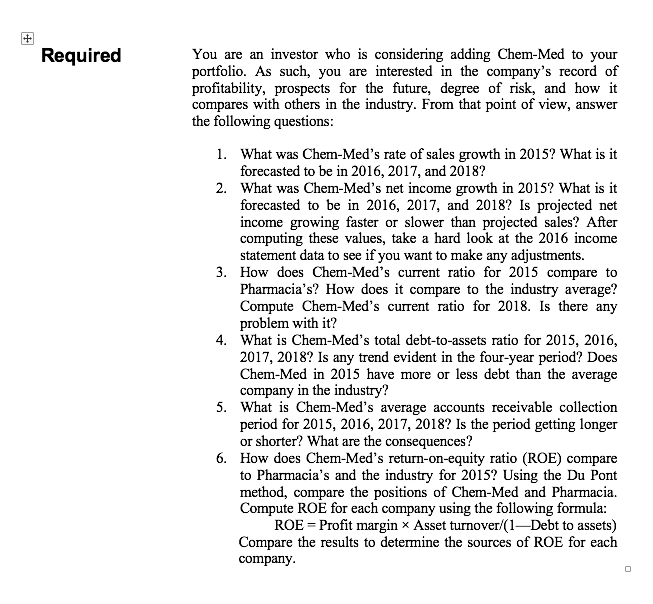
Chem-Med Company at April 9, 2016: Dr. Nathan Swan, age 40, chairman of the board of directors, chief executive officer, and founder of the Chem-Med Company, sat back in his chair and wondered if he wouldn't have been better off staying in his old job of teaching biochemistry Harvard University. This business, he thought, was getting to be a headache. Just a short time ago, it seemed, he was able to spend most of his time in the company's lab comfortably working with test tubes and formulas. Lately, though, all his waking hours (or so it seemed) were taken up with columns of figures, dollars, and spreadsheets. It was true that he wanted the company to make money and grow; but he had no idea that the financial end of the business, about which he knew so little, would take up so much of his time. Dr. Swan was a little mystified by financial matters. How did one describe a company in financial terms anyway? How did one tell if the company was in good or bad shape? (The amount of cash in the company's checking account didn't seem to be a sufficient indicator.) What on earth would one use to convince a bunch of hard-nosed investors that the company was capable of making a lot of money in the next few years if it just had some more money now? (Dr. Swan was always puzzled by the fact that Chem-Med was growing and making money, but it never seemed to have enough cash.) Dr. Swan reflected back over Chem- Med's origins and the events that led up to today. Chem-Med began operations in 2001 after Dr. Swan completed the development of commercial-scale isolation of sodium hyaluronate (hereafter referred to as HA), a naturally occurring biological fluid that is useful in eye surgery and other medical and veterinary uses. The isolation process, complex and proprietary to the company, involves extracting and purifying HA from rooster combs. Initial seed money for the enterprise came from research grants from Harvard University and the U.S. Department of Agriculture (Food and Drug Admin-istration), plus contributions from Dr. Swan's colleague and associates, who were now classified as the company's stock- holders (254 as of April 2016, all closely heldnot traded publicly). In mid-2009, Chem-Med commenced the manufacture and distribution of its first product, VISCAM, which is used to hold tissues in place during and after surgery of the retina. In late 2010, Chem-Med received regulatory approval to market another HA product known as VISCHY, which is used for the treatment of degenerative joint diseases in horses. The two products, VISCHAM and VISCHY, are the only ones Chem-Med currently produces; however, the company has an active R&D program that is currently investigating other applications. There are only two other manufacturers of FDA-approved HA products in the world: AB Fortia, a Swedish corporation, which manufactures a product called Healon in Sweden and distributes it in the United States through a subsidiary, Pharmacia, Inc., and Cilco, Inc., of Huntington, West Virginia. Chem-Med has about a 25 percent share of the market (for HA products in eye surgery) against Cilco's 16 percent and Pharmacia's 59 percent. Pharmacia, with the power of giant AB Fortia behind it, waged a continuing marketing war with Chem-Med, undercutting Chem-Med's prices and wooing its costumers away at every opportunity. The matter came to a head in September, when Chem-Med filed a $13 million suit against Pharmacia, charging unfair trade practices. Dr. Swan was reasonably confident that Chem-Med would prevail in the suit, and, in fact, Pharmacia had recently offered to settle out of court for $500,000. Dr. Swan's primary problem, he said, was that, although he was convinced the company was sound and would grow, he wasn't sure how to communicate that to potential investors in the financial community in a way that would convince them. Just handing out past income statements and balance sheets that he received from the accountants didn't seem to be enough. Further, he wasn't even sure the company needed outside financing, let alone how much. He just felt that they would need it, since they had always had to ask for money in the past. Figure 1 CHEM-MED COMPANY Income Statements 2013-2015 (in 000s) Pro Forma Income Statements 2013 2014 2015 2016 2017 2018 S7,475 2.154 5,321 2,120 Net sales (all credit). Cost of goods sold. Gross profit. Selling, etc., expenses Other inc (exps)* Operating profit Interest expense Income before tax. Income taxes (40% in 1986; 33% thereafter) Net income... $ 777 257 520 610 0 (90) 11 (101) $3,051 995 2,056 705 0 1,351 75 1,276 S10 $ 766 S3,814 1.040 2,774 964 0 1,810 94 1,716 566 S1150 $5,340 1.716 3,624 1,520 500 2,604 202 2,402 793 $1.609 S10,466 3,054 7,412 2,645 0 4,767 434 4,333 1.430 S 2.903 3,201 302 2,899 957 $1.943 $ 101 Dividends paid. 0 0 0 0 0 0 Increase in retained earnings ($ 101) $ 766 $1,150 $1,609 S1,943 S 2,903 Average number of shares 2,326 2,326 2,347 2,347 2,347 2,347 Earnings per share ($ 0.04) $ 0.33 S 0.49 $ 0.69 S 0.83 S 1.24 Other Inc (Exps) refers to extraordinary gains and losses. In 2016, S500,000 is expected from Pharmacia, Inc., in settlement of their suit. ** Shares are not publicly traded. Figure 2 CHEM-MED COMPANY Balance Sheets As of Dec. 31, years ended: Pro Forma Balance Sheets As of Dec. 31, years ended: 2013 2014 2015 2016 2017 2018 S 124 100 151 28 403 1,901 81 1,820 0 S2.223 S 103 409 302 59 873 2,298 82 2,216 101 S3.190 $ 167 564 960 29 1,720 2,917 346 2,571 200 $4,491 $ 205 907 1,102 41 2,255 4,301 413 3,888 200 $6.343 $ 422 1,495 1,443 57 3,417 5,531 522 5,009 215 $8.641 S 101 2,351 798 11 3,261 8,923 588 8,335 399 S11.995 Assets: Cash and equivalents Accounts receivable.. Inventories Other current Total current assets Property, plant, and equipment.. Less: accumulated depreciation Property, plant, and equipment, net. Other fixed assets.. Total assets Liabilities: Accounts payable.. Short-term debt. Total current liabilities. Long-term debt. Total liabilities. Equity: Common stock. Retained earnings Total equity... Total liabilities and equity 210 35 245 17 262 S 405 39 444 19 463 $ 551 42 593 21 614 $ 771 59 830 27 857 $1,080 82 1,162 50 1,212 S 1,512 135 1,647 17 1,664 2,062 (101) 1,961 S2.223 2,062 665 2,727 S3.190 2,062 1,815 3,877 $4.491 2,062 3,424 5,486 $6.343 2,062 5,366 7,428 $8.641 2,062 8,269 10,331 $11.995 Dr. Swan had lunch with his banker just recently, and the banker mentioned several restrictive covenants that the company would have to meet if it came to the bank for financing. Dr. Swan pulled a sheet of paper from his desk drawer and glanced at it. There were three covenants listed: The current ratio must be maintained above 2.25 to 1. The debt-to-assets ratio must be less than 3 to 1. Dividends cannot be paid unless earnings are positive. Dr. Swan didn't think he would have any trouble with those, but he wasn't sure. Then he suddenly remembered he was supposed to meet a representative from one of the local supermarket chains (who supplied Chem-Med with rooster combs) in five minutes. He hurriedly put his papers away and wished he had more time to analyze the numbers before the next board of directors meeting. (The financial information is presented in Figures 1, 2, and 3.) Figure 3 Biotechnology Industry Statistics Median Company in SIC 2831 Biological Products * 2014 Current ratio Quick ratio Inventory tumover. Total asset turnover Return on sales Return on assets. Return on cquity Total debt to assets 2013 2.5 1.2 5.5 1.15 4.00% 4.60% 7.64% 0.40 2.3 1.1 5.6 1.16 4.00% 4.64S 8.44% 0.45 2015 2.4 1.3 5.7 1.18 5.00% 5.90% 12.29% 0.52 Selected Statistics Pharmacia Company Current ratio Quick ratio Inventory tumover. Total asset turnover Return on sales Return on assets. Return on equity Total debt to assets. Price-carnings ratio. Average stock price 2013 2.8 1.5 5.6 1.9 6.00% 11.40% 19.04% 0.40 13.7 $21.78 2014 2.7 1.3 5.7 2 6.50% 13.00% 27.66% 0.53 14 $24.92 2015 2.8 1.6 5.8 1.9 7.00% 13.30% 29.56% 0.55 15 $31.50 Source: Dun's Industry Ratios. The data have been adjusted for this case. Required You are an investor who is considering adding Chem-Med to your portfolio. As such, you are interested in the company's record of profitability, prospects for the future, degree of risk, and how it compares with others in the industry. From that point of view, answer the following questions: 1. What was Chem-Med's rate of sales growth in 2015? What is it forecasted to be in 2016, 2017, and 2018? 2. What was Chem-Med's net income growth in 2015? What is it forecasted to be in 2016, 2017, and 2018? Is projected net income growing faster or slower than projected sales? After computing these values, take a hard look at the 2016 income statement data to see if you want to make any adjustments. 3. How does Chem-Med's current ratio for 2015 compare to Pharmacia's? How does it compare to the industry average? Compute Chem-Med's current ratio for 2018. Is there any problem with it? 4. What is Chem-Med's total debt-to-assets ratio for 2015, 2016, 2017, 2018? Is any trend evident in the four-year period? Does Chem-Med in 2015 have more or less debt than the average company in the industry? 5. What is Chem-Med's average accounts receivable collection period for 2015, 2016, 2017, 2018? Is the period getting longer or shorter? What are the consequences? 6. How does Chem-Med's return-on-equity ratio (ROE) compare to Pharmacia's and the industry for 2015? Using the Du Pont method, compare the positions of Chem-Med and Pharmacia. Compute ROE for each company using the following formula: ROE = Profit margin * Asset turnover/(1-Debt to assets) Compare the results to determine the sources of ROE for each company












